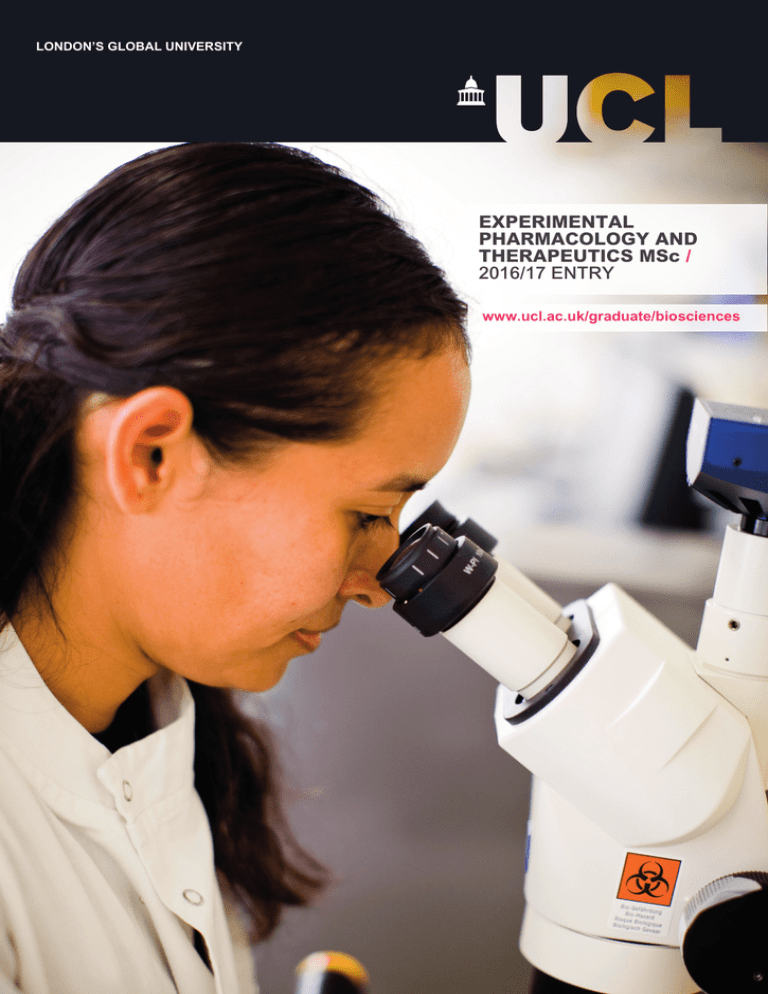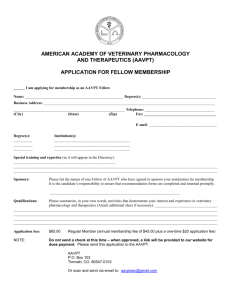EXPERIMENTAL PHARMACOLOGY AND THERAPEUTICS MSc /
advertisement

LONDON’S GLOBAL UNIVERSITY EXPERIMENTAL PHARMACOLOGY AND THERAPEUTICS MSc / 2016/17 ENTRY www.ucl.ac.uk/graduate/biosciences Experimental Pharmacology and Therapeutics MSc / This programme teaches advanced experimental approaches to dissecting the mechanisms of drug action (pharmacology), a science that has seen innovative theoretical and technical development at UCL for over a century. Degree summary In addition to providing experience of both classical and modern pharmacological techniques, the programme will help develop skills for literature search-based data acquisition and analysis, written and verbal communication of science; abstract writing; poster preparation; graphical processing; image preparation for publication; writing a scientific paper; and giving research presentations. // // The programme is jointly taught by UCL Neuroscience, Physiology & Pharmacology (Division of Biosciences), and Research Department of Pharmacology at the UCL School of Pharmacy. Both departments are historically and currently internationally leading in this field, and together provide cutting-edge education in theory, research practice and innovation in pharmacology. The programme is designed to impart extensive experimental expertise and its application towards drug development and subsequent therapeutics. The combination of traditional and experimental approaches in pharmacology, coupled with current innovation in therapeutics and drug discovery and development, fosters a unique set of skills, which will enable graduates of the programme to engage in various aspects of pharmaceutical research globally. The programme is delivered through a combination of lectures, journal clubs, practicals, tutorials and a laboratory project. Student performance is evaluated through formal examination, coursework, and the research project. Degree structure Mode: Full-time: 1 year Students undertake modules to the value of 180 credits. The programme consists of three core modules (75 credits), one optional module (15 credits), and a research project (90 credits). CORE MODULES // Investigative Pharmacology // Molecular Pharmacology // Practice of Science OPTIONS // Clinical Pharmacology and Therapeutics // Drug Design and Development // Neuropharmacology // Pharmacology of Inflammation // Receptor Mechanisms // Synaptic Pharmacology DISSERTATION/REPORT // Students undertake an original research project which culminates in a 10,000-word dissertation and an oral presentation. Your career This programme will open avenues for careers in biomedical sciences, the pharmaceutical and biotechnology industry and clinical laboratories, and extend to clinicians interested in moving towards a scientific career. Students will obtain a thorough knowledge of and practice in pharmacological assessment, drug design and development pathways. It is anticipated that graduates will move onto PhD programmes and/or build careers in industry or clinical investigations through employment as research associates/scientists in the pharmaceutical industry or academia. Employability The knowledge and transferable skills developed on this programme will be advantageous for those considering employment in any pharmaceutical or healthcare setting, or contemplating further studies in related fields. The programme will also provide excellent training in critical appraisal of complex data, which will transfer well to other disciplines. Entry requirements Normally a minimum of an upper second-class UK Bachelor's degree from a UK university, in life sciences, pharmaceutics, biotechnology or pharmacy, or an overseas qualification of an equivalent standard. Professional or other qualifications obtained by written examinations and approved by UCL, together with at least three years of appropriate professional experience, will also be considered. English language proficiency level If your education has not been conducted in the English language, you will be expected to demonstrate evidence of an adequate level of English proficiency. The level of English language proficiency for this programme is: Good. Information about the evidence required, acceptable qualifications and test providers is provided at: www.ucl.ac.uk/graduate/english-requirements Your application The deadline for uk/eu applicants is 29 July 2016. The application deadline for overseas applicants is 30 June 2016. Students are advised to apply as early as possible due to competition for places. Those applying for scholarship funding (particularly overseas applicants) should take note of application deadlines. When we assess your application we would like to learn: // why you want to study Experimental Pharmacology and Therapeutics at graduate level // why you want to study Experimental Pharmacology and Therapeutics at UCL // // what particularly attracts you to this programme // where you would like to go professionally with your degree how your personal, academic and professional background meets the demands of a challenging academic environment Together with essential academic requirements, the personal statement is your opportunity to illustrate whether your reasons for applying to this programme match what the programme will deliver. Details on how to apply are available on the website at: www.ucl.ac.uk/graduate/apply PDF Updated: May 25, 2016 Information correct at time of going to press. See website (www.ucl.ac.uk/biosciences/) for latest information FEES AND FUNDING // UK & EU (2016/17) entry: £12,570 (FT) // Overseas (2016/17) entry: £24,400 (FT) Full details of funding opportunities can be found on the UCL Scholarships website: www.ucl.ac.uk/scholarships APPLICATION DATE UK/EU applicants: 29 July 2016 Overseas applicants: 30 June 2016 CONTACT Miss Jenni Todd Email: j.todd@ucl.ac.uk Telephone: +44 (0)20 3108 4057


